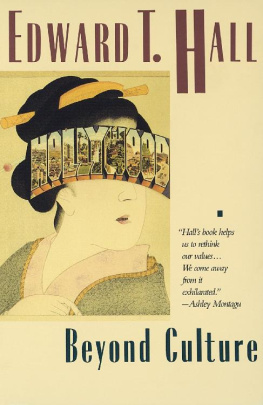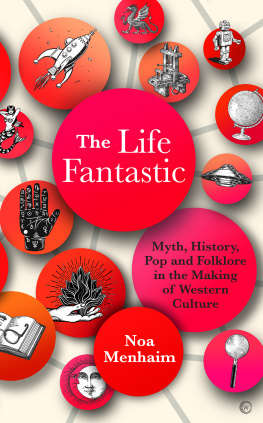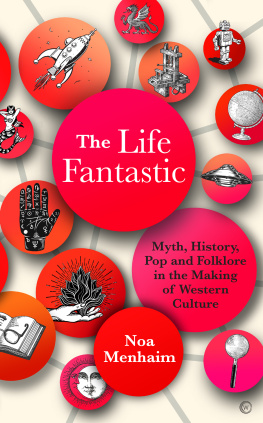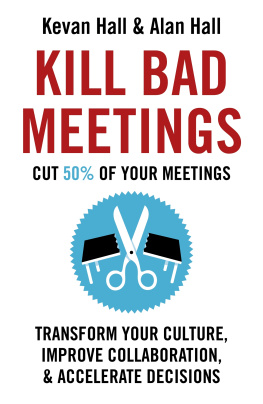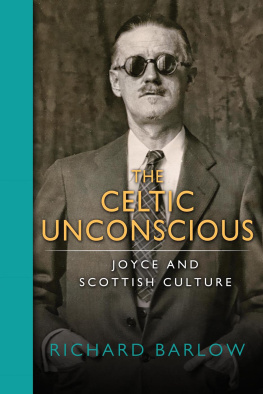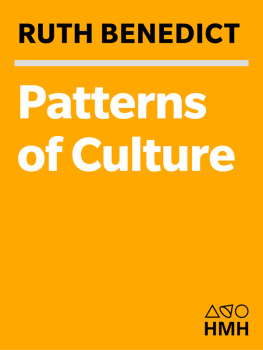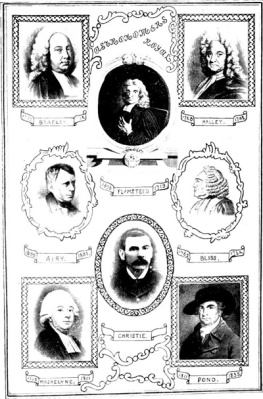Edward T. Hall
"I have found Beyond Culture a rich experience."
Marshall McLuhan
"This is one of those books that just might make us a bit smarter about ourselves, our fellow humans, and the world we live in."
John Holt
"Beyond Culture continues the inquiry familiar from The Silent Language and The Hidden Dimension by America's most sensitive ethnologist into aspects of the covert culture which, at times, becomes painfully overt in cross-cultural confrontations."
Sociology
"Hall is a keen observer. [His] book is laced with an impressive assortment of tidbits of information on topics as diverse as language, brain structure, bowerbirds and mental imagery."
New York Times Book Review
"[Provides] a good understanding of the manner in which culture conditions us to perceive our world, and those who inhabit it, in certain predetermined ways."
Pacific Sun
"Written in a popular and colloquial manner, this book deserves the status of authority."
Worcester Sunday Telegram
"Hall's book helps us to rethink our values We come away from it exhilarated."
Ashley Montagu
BEYOND CULTURE
Books by Edward T. Hall
THE SILENT LANGUAGE
THE HIDDEN DIMENSION
HANDBOOK FOR PROXEMIC RESEARCH
THE FOURTH DIMENSION IN ARCHITECTURE:
The Impact of Building on Man's Behavior
(with Mildred Reed Hall)
THE DANCE OF LIFE:
The Other Dimension of Time
HIDDEN DIFFERENCES:
Doing Business with the Japanese
(with Mildred Reed Hall)
BEYOND CULTUREEDWARD T. HALL
ANCHOR BOOKS
DOUBLEDAY
NEW YORK LONDON TORONTO SYDNEY AUCKLAND
AN ANCHOR BOOK
PUBLISHED BY DOUBLEDAY
a division of Bantam Doubleday Dell Publishing Group, Inc.
1540 Broadway. New York. New York 10036
ANCHOR BOOKS, DOUBLEDAY, and the portrayal of an anchor
are trademarks of Doubleday, a division of Bantam Doubleday
Dell Publishing Group, Inc.
Beyond Culture was originally published in hardcover
by Anchor Books/Doubleday in 1976.
ISBN 0-385-12474-0
Copyright 1976, 1981 by Edward T. Hall
ALL RIGHTS RESERVED
PRINTED IN THE UNITED STATES OF AMERICA
Anchor Books 1977, 1989
24 23 22 21 20
ACKNOWLEDGMENTS
Grateful acknowledgment is made for permission to use excerpts from copyrighted material, as follows:
From pp. 100-1 of A HIGH WIND IN JAMAICA, by Richard Hughes. Copyright 1928, 1929, by Richard Hughes; renewed 1956, I957, by Richard Hughes. Reprinted by permission OI Harper & Row, Publishers, Inc.
From "Conceptual Categories in Primitive Languages," by Edward Sapir, Science , Vol. 74, 4 December 1931, p. 578. Reprinted by permission of Science .
From LOLITA, by Vladimir Nabokov. Copyright 1955 by Vladimir Nabokov. Reprinted by permission of C. P. Putnam's Sons, Publishers.
From pp. 16-17 of THE FOX IN THE ATTIC, by Richard Hughes. Copyright 1961 by Richard Hughes. Reprinted by permission of Harper & Row, Publishers, Inc.
From BILLY BUDD, by Herman Melville. New York: The New American Library, 1961.
From HOW CHILDREN FAIL, by John Holt. New York: Pitman Publishing Corporation, 1964. Reprinted by permission.
From "Paralinguistics, Kinesics and Cultural Anthropology," by Weston La Barre in APPROACHES TO SEMIOTICS, by T. A. Sebeok, A. S Hayes, and M. C. Bateson (eds). The Hague. Mouton & Co, N.V. Publishers, 1962.
From ECOLOGICAL PSYCHOLOGY, by Roger C. Barker. Stanford, Calif.: Stanford University Press, 1968.
From "Speaking of Books: Yasunari Kawabata," New York Times Book Review, 8 December, 1968, by Donald Keene. Copyright 1968 by The New York Times Company. Reprinted by permission.
From THE UNEXPECTED UNIVERSE, by Loren Eiseley. New York; Harcourt Brace Jovanovich, Inc., 1969.
From "The Functional Organization of the Brain," by A. R Luria. Copyright 1970 by Scientific American, Inc. All rights reserved.
From "The Origins of Taxonomy," by Peter H. Raven, Brent Berlin, and Dennis E. Breedlove, Science , Vol. 174, 17 December 1971, pp. 1210-13. Copyright 1971 by the American Association for the Advancement of Science.
From IN THE SHADOW OF MAN, by Jane Van Lawick-Goodall. Boston: Houghton Mifflin Company, 1971.
From JOURNEY TO IXTAN, by Carlos Casteneda. Reprinted by permission of Simon and Schuster.
From "Neural Basis of Vision," by Peter Gouras and Peter O. Bishop, Science , Vol. 177, 14 July 1972, pp. 188-89. Copyright 1972 by the American Association for the Advancement of Science.
From "Dionysians and Apollonians," by A. Szent-Gygyi, Science , Vol. 176, 2 June 1972, p. 966. Copyright 1972 by the American Association for the Advancement of Science.
From "The Principle of Tolerance," by J. Bronowski. Copyright 1973 by The Atlantic Monthly Company, Boston, Mass. Reprinted with permission
From "Primate Field Studies and Social Science," by S. L. Washbum. In CULTRAL ILLNESS AND HEALTH, by Laura Nader and Thomas W. Maretzki (eds). Reproduced by permission of The American Anthropological Association from Anthropological Studies No. 9. Cultural Illness and Health, p. 130, 1973.
This book is dedicated to three friends:
Winifred, Lawn, and Jay,
all physicians who are not made anxious
by their patient's health.
Contents
BEYOND CULTURE
Introduction
There are two related crises in today's world. The first and most visible is the population/environment crisis. The second, more subtle but equally lethal, is humankind's relationships to its extensions, institutions, ideas, as well as the relationships among the many individuals and groups that inhabit the globe.
If both crises are not resolved, neither will be. Despite our faith in technology and our reliance on technological solutions, there are no technical solutions to most of the problems confronting human beings. Furthermore, even those technical solutions that can be applied to environmental problems can't be applied rationally until humankind transcends the intellectual limitations imposed by our institutions, our philosophies, and our cultures. Compounding all of this is the reality of politics.
Politics is a major part of lifebeginning in the home and becoming more and more visible as power is manifest in the larger institutions on the local, national, and international level. We should not be fooled by the faade of either politics or political institutions. What we are talking about is power and its use. Certainly there is more to life than either disguised or raw power: at least one hopes that in time the power motive will combine with more rational, more humane ways of proceeding. Apart from power, culture still plays a prominent visible role in the relations between Russians and the West, for example. Culture has always been an issue, not only between Europe and Russia, On the horizon are the multiple cultures of Africa and the emerging nations of Latin America demanding to be recognized in their own right. In all these crises, the future depends on man's being able to transcend the limits of individual cultures. To do so, however, he must first recognize and accept the multiple hidden dimensions of unconscious culture, because every culture has its own hidden, unique form of unconscious culture.
Exacerbating the world's political and cultural problems are environmental and economic crises. As Hardin commons the most, while losses were shared by all the users. Those who exercised restraint were doubly penalized. Not only did they suffer losses from the overgrazing of neighbours, but they were unable to exploit the market by means of their own production.
Today, the sea, the air, the waterways, the earth, the land and what it produces have all become our commons, and all are being overused. It is clear that appeals to altruism are futile and in a sense foolhardy. Technology will not resolve this dilemma either because these are human problems. Hardin argues that the single-track, Newtonian approach will satisfy only the politicians and the big exploiters of the commons who stand to gain from over-simplification of issues. What is needed, he feels, is a more comprehensive, Darwinian (Dionysian) approach that can be used as a basis for establishing priorities, alternatives, and options. In a word, unless human beings can learn to pull together and regulate consumption and production patterns, they are headed for disaster. It is impossible to cooperate or to do any of these things unless we know each other's ways of thinking.

